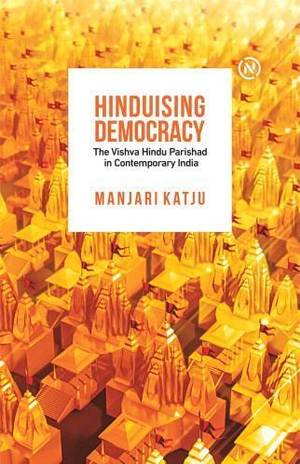Manjari Katju’s second treatise on the Vishva Hindu Parishad (VHP), is a sort of sequel to her previous publication entitled The Vishva Hindu Parishad and Indian Politics (2003), a pioneering and comprehensive study on the ideology and politics of the VHP. While the first volume traced VHP’s rise to power through the Ramjanmabhoomi Movement (RJM), the present one, besides tracking the VHP activism in the post-Ramjanmabhoomi period, dissects how the VHP has been ‘Hinduising Democracy’, ‘Building Hindu Nationhood’ and ‘Raising Hindu Dharmic Consciousness’. There is nothing surprising in the VHP’s mission though; after all, the very purpose of the foundation of this religio-nationalist outfit of the RSS, has been to invoke Hindu religiosity and craft it with the nation, arouse and organize Hindus as a homogenous entity, and create a ‘syndicated Hinduism’. Hence, VHP’s mission is much broader than ‘Hinduizing democracy’; its focus has been more on the religious and social sphere rather than the political sphere, which remains the BJP’s prerogative.
The BJP, as a ruling party, may have constitutional constraints to pronounce India as a Hindu nation, but its sibling, not being a political party, does have all the freedom to say so. Thus, it attacks the ‘anti-Hindu’ ethos of the Indian state and its minority-pandering, and rejects the foundational principles of India’s constitutional democracy—pluralism, secularism and minority rights. The VHP’s most revered leader, the late Ashok Singhal was clear: ‘Secularism is the enemy of this country. It is a conspiracy to destroy Hindu society’ (p. 63); thus, for the VHP, destruction of secularism is the pre-condition for the protection of Hindu society. Negating the Nehruvian worldview, the VHP completely delinks secularism from democracy. Comparing the VHP with radical Right groups of the West, Katju observes that like the latter, the VHP does not reject democracy, rather it calls for a change in the democratic system (p. 50). This change will rectify the error of secular policies which marginalized the majority Hindus and made the minorities dominant. Hence, both polity and politics need to be Hinduized. This will automatically ensure secularism as Hindus are inherently secular.

